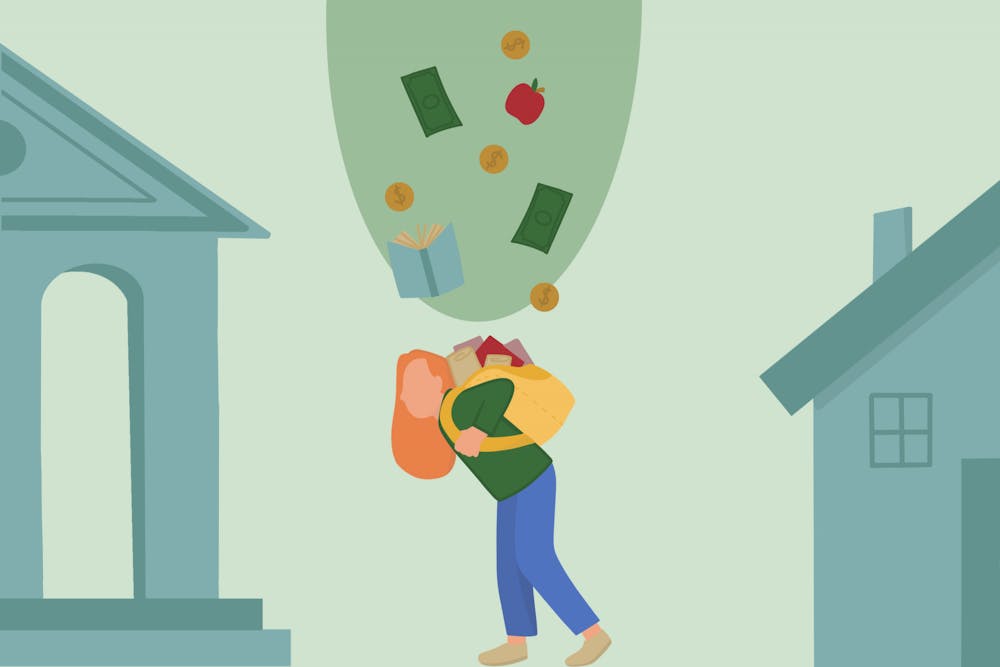With inflation surpassing 17.67% over the last four years, college students need to budget in order to counteract the damage high inflation has done to their bank account.
Grocery items have doubled in price, gas prices are up 22% ($2.59 per gallon in 2018 compared to $3.16 in 2023) and the cost for a date night has increased by 47% ($84.92 in 2018 compared to $159 in 2023), due to increases in production costs and global conflict. The best way to combat these expenses is to establish a budget.

USC finance professor John Hackney said that the best way for students to battle inflation is using run-of-the-mill budgeting and becoming literate in basic personal finance techniques.
Understanding your monthly income is a great first step in deciding how you need to begin budgeting. While this may sound tedious, your bank app or a personal finance app like Mint can help you recognize where your money is going.
While inflation is universal, there are goods and services you can avoid to save yourself from the spike.
Restaurant prices, airfare and utilities are some services that can be cut back or used only when necessary. If you map out where most of your money is going and figure out if the big expenses are a need or a want, then you should find substitutes or just avoid "want" costs when able.
The biggest mistake students make is not becoming fully financially literate, Hackney said. Things like not having a credit card — and therefore not having a credit score — not knowing when and how to start saving and not understanding interest payments are all things Hackney said can hurt you financially later on.
"Understanding the basics of how a loan works and payments. I think that those are the biggest issues," Hackney said.
Contrary to what Dave Ramsey, a personal finance radio coach says, credit cards are a great way to start building your credit, helping you in the future with lower loan rates, as well as free perks that come along with paying your credit card balance off each month.
"A lot of students, you don't have a credit history, so you don't have a credit score, which hurts you when you go out into the real world," Hackney said.
This doesn’t mean get a credit card, go on a shopping spree and hope that you can pay the bill off at the end of the month. Use your credit card alongside your budget, with constant reassurance knowing that you will be able to pay it off soon.
Seventy percent of college graduates leave school with student loan debt, and understanding payments and the ways loans work is much more important than worrying about making investment mistakes. With President Joe Biden's student loan forgiveness plan up for debate in the Supreme Court, many graduates need to know what to do if it doesn't remain. Know how compounding interest works and ways you can use the interest for your own good.
If saving is something you can afford to do, get on it. Interest rates are higher than normal, meaning you can get a much more significant rate of return on your investment in a savings account. Hackney said you should start saving as early and as much as possible and let compounding interest do the rest.
Most importantly, you should do your research to find online savings accounts that will serve the largest yield in return.
The average savings account rate for a brick-and-mortar bank is 0.23%, but if you shop around and find an online savings account, you can earn close to 5% on your savings. Take the time to find a good one, and the reward will be worth it. When searching for an online bank, make sure it is insured by the FDIC, and you will be covered just like you would for your normal bank.
If you were to deposit $5,000 into your normal bank savings account, you would end up with $5,011.50 after a year, but putting that money into a low-risk, high-yield savings account could earn you $5,250 after one year. After 10 years, you are making more than $3,000 more, just by simply putting your money into a different savings account.
When figuring out how much you should be saving, go back to your budget. You shouldn’t just be putting whatever you have left over at the end of the month into savings. Savings should be an allotted part of your budget, just like your other spending needs.
If you can directly deposit your work check into a savings account, that is your best bet, so you won’t be tempted to spend that money on other money-eating areas.
Start budgeting, saving and understanding personal finance basics, and you will be able to prosper financially.
“All of the changes are small," Hackney said. "But it can have a big impact.”

